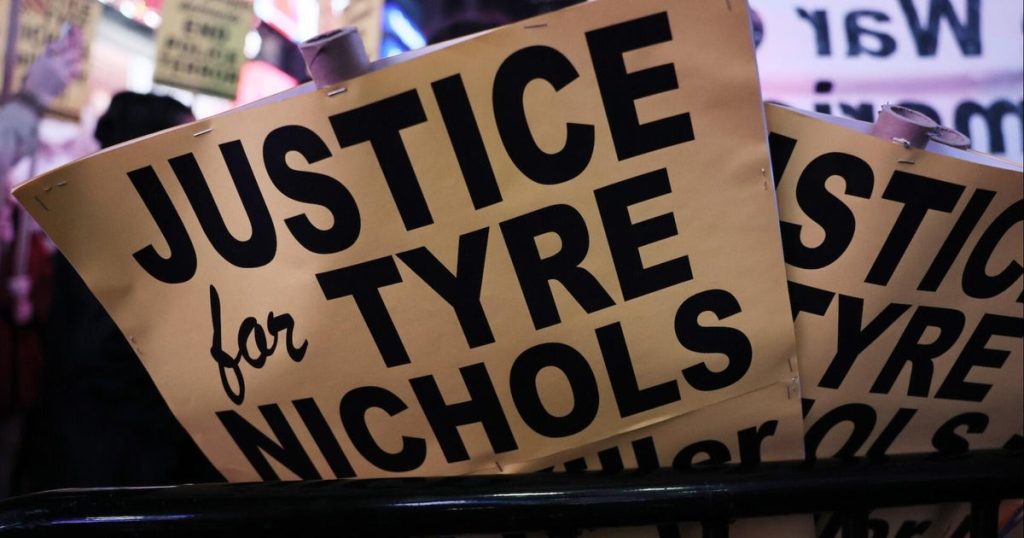In a significant development in the case concerning the fatal beating of 29-year-old Tyre Nichols, U.S. District Judge Mark S. Norris has recused himself just days before sentencing five former Memphis police officers convicted in the incident. This unexpected change has raised questions regarding the timing of the sentencing procedures. Following the recusal, Judge Sheryl H. Lipman has been assigned to take over the case, although the exact implications of this shift remain unclear.
| Article Subheadings |
|---|
| 1) Background of the Case |
| 2) Judge’s Recusal Details |
| 3) Sentencing Timeline and Implications |
| 4) Broader Impact on Police Reform |
| 5) Future Developments and Community Response |
Background of the Case
The case surrounding the brutal beating of Tyre Nichols has drawn national attention and ignited widespread protests against police brutality. Nichols was pulled from his vehicle on January 7, 2023, by five officers from the Memphis Police Department’s Scorpion Unit. Body camera footage revealed that these officers pepper-sprayed, tased, and subsequently jumped on Nichols, delivering a series of punches and kicks while he pleaded for his mother. This horrifying incident took place merely a short distance from Nichols’ home and resulted in his death three days later, on January 10, 2023. The video evidence showed the officers’ indifference as they stood by and talked while Nichols struggled for his life, fueling public outrage and demands for accountability.
Judge’s Recusal Details
On Friday, Judge Mark S. Norris unexpectedly announced his decision to recuse himself from the ongoing case, stating in a brief order that he would return the matter to the Clerk for reassignment to another judge. The decision came as a surprise since he had been involved in the proceedings since federal indictments were filed in September 2023. A number of motions had been submitted under seal before the judge’s recusal, but it remains unclear whether any of these motions prompted his departure. Judge Norris had already accepted guilty pleas from two of the officers and presided over the trial of the other three in October. The unusual timing of his recusal, coming so close to the sentencing phase, has raised eyebrows and questions about the underlying motivations.
Sentencing Timeline and Implications
As it stands, the sentencing for the convicted officers was lined up for the next week, although the abrupt change in judges may disrupt the established timeline. Tadarrius Bean, Demetrius Haley, and Justin Smith were scheduled to be sentenced on Monday and Tuesday, while Emmitt Martin and Desmond Mills Jr. would face their sentencing on June 23. In total, these officers were found guilty of varying charges, including civil rights violations and obstruction of justice stemming from their attempts to cover up the beating. However, the reallocation of the case to Judge Sheryl H. Lipman may introduce new dynamics, including potential delays as the new judge reviews the case and its associated files.
Broader Impact on Police Reform
This case has rippled through public discourse and has dramatically influenced views on police practices not only in Memphis but across the United States. Following the death of Nichols, advocacy groups have amplified calls for meaningful police reform. The Scorpion Unit, under which the officers operated, was disbanded shortly after Nichols’ death, marking a significant shift in local law enforcement strategies aimed at combating violent crime. The U.S. Department of Justice has also initiated investigations into systemic issues within the Memphis Police Department, revealing excessive force and discriminatory practices against Black individuals. These developments have reinvigorated discussions about accountability and transparency in policing, sparking movements for legislative changes aimed at curtailing police misconduct nationwide.
Future Developments and Community Response
The unprecedented community activism surrounding the case demonstrates a growing demand for accountability in law enforcement. Local organizations and citizens have been vocal about the need for reform, culminating in the establishment of a task force aimed at addressing the systemic problems identified within the Memphis Police Department. The Mayor’s office has committed to taking actionable steps toward police reform, emphasizing the need for a comprehensive review of law enforcement strategies. Meanwhile, community members, demonstrators, and activists continue to monitor developments closely, advocating for justice as the case unfolds further under the new judge’s supervision. The change in judges may present new opportunities for advocacy and dialogue, but it also continues to pose challenges amidst community unrest.
| No. | Key Points |
|---|---|
| 1 | U.S. District Judge Mark S. Norris recused himself from the case concerning the beating of Tyre Nichols. |
| 2 | The five former officers were convicted of various crimes, including civil rights violations. |
| 3 | Judge Sheryl H. Lipman has been assigned to the case after Norris’ recusal. |
| 4 | The abrupt recusal has raised questions about the timing of the sentencing procedures. |
| 5 | The case has catalyzed widespread calls for police reform and accountability nationwide. |
Summary
The recusal of Judge Mark S. Norris marks a pivotal moment in the legal proceedings surrounding the tragic beating death of Tyre Nichols. The transition to Judge Sheryl H. Lipman carries implications for the sentencing of the involved officers, who have faced considerable public scrutiny. This case not only highlights the need for accountability among law enforcement officers but also emphasizes the ongoing struggle for comprehensive police reform in America.
Frequently Asked Questions
Question: Who is Tyre Nichols?
Tyre Nichols was a 29-year-old Black man who died after being brutally beaten by Memphis police officers in January 2023.
Question: What charges were the officers facing?
The five officers were charged with civil rights violations, obstruction of justice, and other offenses related to the beating of Tyre Nichols.
Question: What is the Scorpion Unit?
The Scorpion Unit was a specialized crime suppression team within the Memphis Police Department that has since been disbanded following Nichols’ death due to its excessive use of force against citizens.


